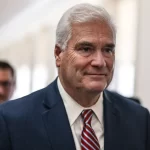The high-stakes race for the House speakership entered a new phase Tuesday evening, with a slate of more Republicans vying for the gavel after Minnesota Rep. Tom Emmer withdrew his bid just hours after winning the GOP conference’s nomination.
The party is under intensifying pressure to find a new leader, though it remains increasingly unclear whether any Republican can get the 217 votes needed to win the gavel on the House floor.
After Emmer’s abrupt exit, the conference pivoted toward finding a new nominee, with five candidates in the running.
Members will cast a successive series of secret ballots, and the candidate who garners the fewest number of votes in each round will be dropped from the running. The winning candidate will still need a majority of the conference behind them, meaning that it’s possible the race for speaker might not be fully settled at the end of the conference meeting.
Here are the Republican lawmakers vying for the speakership:
Rep. Byron Donalds
The Freedom Caucus member from Florida, who’s among the few Black Republicans in Congress, first announced on X that he would seek the speakership to advance a “conservative vision for the House of Representatives and the American people.”
Donalds received votes from the GOP’s far-right members in January’s speaker marathon as a protest to Kevin McCarthy, who ultimately clinched the speakership after 15-rounds of voting but was ousted earlier this month.
Donalds is serving his second term, winning his first election to Congress in 2020 after GOP Rep. Francis Rooney vacated Florida’s 19th Congressional District. The Florida State University graduate worked in the banking, finance, and insurance industries before being elected to the Florida House of Representatives in 2016, according to his office.
Rep. Chuck Fleischmann
The Tennessee Republican was first elected to Congress in 2010.
A University of Tennessee law school graduate, he sits on the House Appropriations Committee, where he chairs the Energy and Water Development Subcommittee, and serves on the Committee on Science, Space, and Technology.
Fleischmann previously supported Ohio Rep. Jim Jordan for speaker.
Rep. Mark Green
The Tennessee Republican has been in Congress since 2019. He chairs the Homeland Security Committee and also sits on the Foreign Affairs Committee.
A veteran and ER doctor, Green was a Tennessee state senator before winning his election to the House of Representatives.
Rep. Mike Johnson
The Louisiana Republican, who serves as the House GOP conference vice chairman, first announced a run for speaker in a letter to his colleagues over the weekend, saying, “After much prayer and deliberation, I am stepping forward now.”
Johnson was first elected to the House in 2016 and serves as a deputy whip for the House GOP. He was previously chairman of the Republican Study Committee, and sits on the Judiciary Committee, Select Committee on the Weaponization of the Federal Government, and on the Armed Services Committee.
Rep. Kevin Hern, an Oklahoma Republican who chairs the influential Republican Study Committee, dropped out of the race for speaker Tuesday evening and backed Johnson.
“I want everyone to know this race has gotten to the point where it’s gotten crazy. This is more about people right now than it should be,” he said. “This should be about America and America’s greatness. For that, I stepped aside and threw all my support behind Mike Johnson. I think he’d make a great speaker.”
Rep. Roger Williams
The Texas Republican was first elected in 2012 and previously supported former speaker nominee Jordan.
Williams is the chairman of the Small Business Committee and serves on the Financial Services Committee.
Williams had previously said that he wouldn’t launch a bid for the speaker’s gavel. In an October 21 statement posted to social media, he said that it “wasn’t the right time” to run for the position.











ftz11v